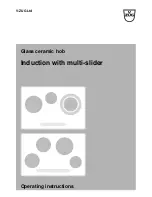
Page EN-14
Cooking zones/areas and sensors
5
(12)
3. Set the heat setting of the cooking zone/
area with the slider sensor (12). Swipe
your finger over the slider sensor until the
desired heat setting is displayed next to
the sensor.
0
= cooking zone/area is switched off
9
= highest heat setting
A few seconds after you remove your fin-
ger, the heat setting display starts to flash
and the heating process begins.
If “ ” flashes in the heat setting display
instead of the heat setting, this may be
caused by one of the following:
– The cookware is not placed on the cor-
rect cooking zone/area.
– The cookware being used is not suitable
for induction hobs.
– The cookware is too small or is not cen-
tred on the cooking zone/area.
As long as there is no suitable cookware on
the cooking zone/area that is switched on, no
heating will occur.
If you lift the pot off a cooking zone/area, “ ”
will also appear in the heat setting display. As
soon as you replace the pot on the cooking
zone/area, the selected heat setting will be
displayed again.
The slider sensor (12) will not respond
to touch while the heat setting display is
permanently illuminated. You can only adjust
the heat setting with the slider sensor if you
have selected a cooking zone/area (flashing
heat setting display).
Changing the heat setting
1. To change the heat setting of a cooking
zone/area during operation, first touch the
sensor of the desired cooking zone/area.
The heat setting display next to the cooking
zone/area will flash.
2. Change the heat setting by swiping left or
right over the slider sensor.
After a few seconds, the indicator for the
selected cooking zone/area will illuminate
permanently and the new heat setting will
have been selected.
The correct heat setting
Please see this table for which heat settings
are suitable for which application. The pre-
cise setting depends, however, on various
factors, for example the type of cookware and
the quantity of food. For this reason, varia-
tions are possible.
Heat
setting
Suitable cooking process
1-2
– Careful heating of small
amounts of food
– Melting chocolate, butter and
sensitive foods
– Light simmering/boiling
– Slow warming
3-4
– Reheating food.
– Continuous cooking
– Cooking rice
5-6
– Roasting
7-8
– Searing meat
9
– Rapid searing
– Deep-frying
– Bringing water/soup to the boil
Summary of Contents for 170 284
Page 34: ......
















































